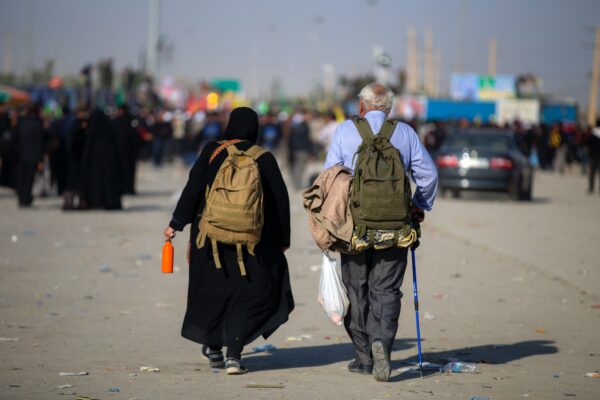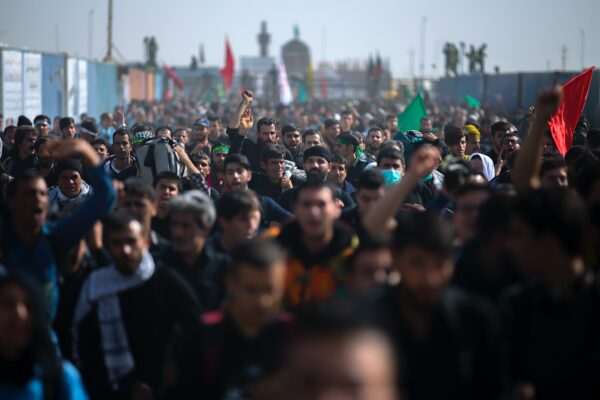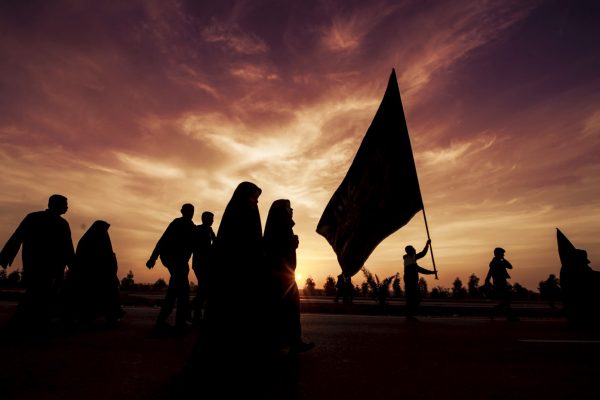Sorrow has been clothed in affectation and made to flounce in display to the critical masses. Meaning and morality have been braided into strands of pomp and worn as a crown of narcissism. Virtue has been fluffed, sacrifice perfumed with ostentation, and truth masked with fabrication. Thus adorned, the procession of Muharram marches into another year of superficiality.
Vile is the taste of disillusionment. I looked upon these airs every year and choked in the bitter reality. I could no longer pretend to myself that the show put on for the public sprung from genuine feeling. I could not get myself to become one of the exhibitions in this parade of empty rituals.
Every year is the same. I see speakers turn their lectures into gossip and thinly veiled emotional blackmail, guilting their listeners into hating themselves and subconsciously their religion, and I think, “This is not knowledge.”
I see imams urge their attendees to lift their hands to pray for the damnation of a whole nation of people while presenting their own political views as godly, and I think, “This is not Islam.”
I see reciters order their listeners to beat themselves harder, to tear their clothes and muddy themselves, not from genuine grief, but out of thirst for attention and stage-acting, and I think, “This is not sadness.”
I see majalis segregated into groups based on class and nationality, comprised of people dressed as if in celebration of wealth and status under the black guise of mourning, and I think, “This is not remembrance.”
I see youths scorn their elders, elders belittle the youth, parents abase their children with blame and children mistrust their parents because on the pulpit stands an authority pointing the finger of suspicion. I see this and think, “This is not unity.”
I see desperation in the attempts at weeping, a fear of being deemed heartless, a greed in being seen as empathetic. I see every measure being taken to get people to shed tears but no time spared at imparting the gems of enlightenment that those who are cried over left for their mourners. I see this and think, “This is not love.”
I see gluttony, selfishness, conceit, backbiting, indulgence and excess in the name of charity and think, “This is not sacrifice.”
I see all this every year, and every year I think, anguished, “This is not the legacy of Hussain.” But one year I saw something different. The day I took part in the Arbaeen Walk, a journey trekked over the same earth that the tragedy of Muharram took place, I began to see other things.
I saw an aged man stoop to lift a tray of steaming rice with trembling hands and carry it to his house, where a group of complete strangers sat on his swept hearth awaiting his hospitality. A child, possibly the man’s great grandson, watched him with wide eyes as he taught the new generation, by action alone, what it is really like to be high-minded. I saw this and thought, “This is knowledge.”
I saw scholars and laymen alike urge whoever was in earshot to lift their hands to the heavens and pray for the salvation of every soul, and for the wellbeing of every creation, and I thought “This is Islam.”
A saw faces twist in anguish at the mere mention of the Martyr’s name, and backs stoop with the weight of grief in the darkness of solitude, and I thought, “This is sadness.”
I saw, day after day, countless scenes of selflessness before my eyes, and knew, unseen by any eye but that of the Omniscient’s, countless more took place behind the curtain of discretion. I saw families who could not afford more than two meals a day give everything they possess (and sometimes take a loan which would have to be payed during the rest of the year) to their honored guests, the travellers of the path to Karbala. I saw the gladness on their faces as they did so, and heard their voices rise in exultation of the one in whose name anything spent gets returned seventyfold. I witnessed this and thought, “This is remembrance.”
I saw masses throng, shoulder to shoulder, chest to back, in a sea that surged toward the gleaming dome of the Martyr. I saw different races with different beliefs raise different hands and cry out the same name in unison. I saw identical tracts of tears cut across diverse complexions and I thought, “This is unity.”
I saw a boy of seventeen cross the street at a run to reach a middle-aged man in order to wipe the sweat from his brow and entreat him to partake of the meal his family had cooked for the travellers. I saw a woman fall to her knees on the road and dig her fingers into the dirt to feel the earth that once carried the weight of another woman who, a thousand years ago, had walked the same path until her feet bled. I saw her call out that woman’s name as if it were her mother’s, and invoke blessings upon her and her brother. I saw passersby on the road stoop to kiss the little head of a disabled toddler as they passed, and run a hand through her hair like the Martyr once did to his own children. I saw this and thought, “This is love.”
I saw blisters form, break, and form again on feet that have long passed the point of exhaustion, scarcely protected from the rough, uneven ground by worn-out sandals. I saw hordes of people walk through sheets of freezing rain without umbrellas or coats, as their breath came out in puffs of mist. And in the opposite extreme, I saw the same hordes walk through miles of barren desert under the merciless noontime sun while perspiration soaked through their clothes. I saw the old, young, able, disabled, healthy, diseased, blind, and even amputees walk, crawl, limp, or wheel themselves down this path. Millions in number, some of whom have come from other countries solely to take part of this journey, left behind comfort and safety to pay their respects to the Martyr, knowing full well the very real possibility of them falling victim to a suicide bombing. I saw this and thought, “This is sacrifice.”
I witnessed, as if catching a glimpse of reality in its barest form, the crescendo of raw emotion the travellers reached when they arrived at their destination. Self-consciousness was stripped away in the pressing tide of people. No longer were the visitors individuals with individual prayers and needs; they became one body, one heartbeat, that thrummed a single name to the pulsations of the heavens. They became the earth’s own voice as it cried its innocence from the injustice it witnessed.
I knew this phenomenon, which was displayed in images or in words, was being marvelled at by millions of others behind luminescent screens. I saw tears well in the eyes of people who were thousands of miles away in flesh, but deep within the heart of this earth-beat in spirit. I saw the values of this journey, of this visitation, of this commemoration, taken up by the lovers of the Martyr all over the world and I thought, “This is the legacy of Hussain.”





